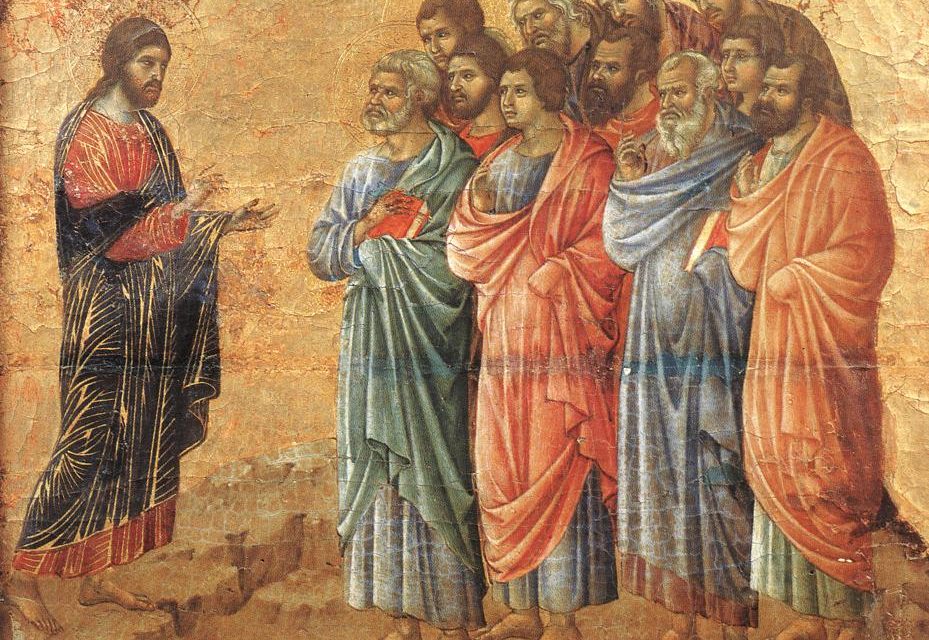originally posted by Beth Haile on Oct 25, 2011
Mal 1:14b-2:2b, 8-10
Ps 131:1, 2, 3
1 Thes 2:7b-9, 13
Mt 23:1-12
Our Gospel for this week in Matthew 23 is a long denunciation of the scribes and Pharisees, ending with Jesus prophesying the destruction of the temple. The Scribes were those who wrote legal documents and were collectively a sort of Jewish guild of intellectuals. The Pharisees, by contrast, were a religious and political movement analogous to a religious order like the Dominicans or Franciscans today. The Pharisees emphasized ritual purity, tithing, and Sabbath observance. Their goal was perfection through strict observance of the Torah, a perfection that was not only accessible to the Jewish elite or to the priestly class, but to all, no matter how poor or humble. By bringing the Temple purity laws to the ordinary person, the Pharisees strove to create a “kingdom of priests and a holy nation” (Daniel Harrington, The Sacra Pagina Commentary on Matthew).
It is easy to read such passages as the Gospel for this week in an anti-Semitic way, in a way that sees Judaism as the antithesis of Christianity. Starting especially in the 19th c., Christian biblical scholars started portraying Judaism as an overly legalistic religion that was grounded in a rigorous practice of the law detached from love of God and love of neighbor. You probably still hear this in sermons all the time, namely that Jesus came to free his people from the excessive legalism of the Pharisees and reveal to them a true religion of love and mercy.
This whole reading of the Pharisees is unjust, and contemporary Biblical scholarship strives to illustrate the agreement between Christian theology and Jewish views. Ulrich Luz notes in his Hermeneia commentary on this passage that we can read the “many rabbinic sources that regard doing the Torah as much more important than simply teaching it, or the not infrequent examples of rabbis who while easing the law for others themselves kept to the ‘heavier’ practice.” Regardless, the Pharisees are clearly the chief rivals of Matthew’s community, and we should expect that Matthew might exaggerate in his portrayal of the Pharisees in order to indicate the discord between the two communities at the time the Gospel was written. Luz writes, however, that this polemic “is not simply an end in itself. Polemics between related sects and religious groups often help to strengthen one’s own identity by emphasizing boundaries. . . The polemics do not directly serve the self-affirmation of those who know that they are different and better; instead, they are a call to become different and better.”
The real focus of this passage is a common motif for the entirety of Matthew’s Gospel, namely that true belief will be accompanied by action. We saw this overarching concern clearly spelled out in the Sermon on the Mount: “Unless your righteousness exceeds that of the scribes and the Pharisees, you will never enter the kingdom of heaven” (5:20). Jesus concludes the Sermon on the Mount by thrice emphasizing the importance of action: the tree and its fruits (7:15-20), the warning against self-deception (7:21-23), and to cap it all off, the contrast between mere hearers and actual doers of what Jesus says (7:24-29). For Matthew, all theology is called into question by the contradiction between faith and practice. Matthew’s portrayal of Jesus is not that of a Jesus who comes to free the people from the law, but rather, a Jesus who comes to show and make possible the perfection and fulfillment of the law.
Matthew emphasizes that while the Pharisees tie up heavy burdens for their people, Jesus’ burden is light, for he himself is “gentle and humble of heart” (Mt. 11:29). The difference between Jesus and his opponents for our Gospel is that Jesus has entered into solidarity with his people. Jesus shares their burden which does indeed make it light. We can read the conclusion of this passage a parenetic call to enter into the same solidarity that Jesus reveals to us. In verses 8-12, Matthew portrays the Church as a family or as the people of God which is modeled on fraternal love rather than hierarchy. Such an image implies solidarity. What is important is not title or power, but rather, fraternal love and mutual concern. The eschatological conclusion reminds “Whoever exalts himself shall be humbled, and whoever humbles himself shall be exalted” (23:12). So too affirms Paul in our reading from 1 Thessalonians: “We were gentle among you, as a nursing mother cares for her children. With such affection for you, we were determined to share with you not only the gospel of God, but our very selves as well, so dearly beloved had you become to us” (as an expectant mother, I find this image particularly moving. There are few greater lessons in humility than childbearing).
The Church, according to Matthew, is called under the umbrella of the exclusive fatherhood of God, and is consequently called to be a community of equals. As our first reading reminds us, we are not called to show partiality: “Have we not all the one father? Has not the one God created us?” (Mal. 2:10). This does not preclude a hierarchy based on gifts or responsibilities, but the challenge for us is to see how all the members of the church can participate fully and equally in the community. As Catholics, this is a particular challenge for us. Many of us are accustomed to rolling into mass three minutes before the opening hymn, half-heartedly mouthing the words of the songs, mumbling the prayers, responses, and creed, and sleep-walking up to the front of the communion line. Vatican II emphasized that the Church should be seen as “the people of God,” but we have often been slow at realizing this vision. As we hear the words of the Gospel this week […], perhaps we can resolve to become more active participants in our church communities, sharing our gifts and bearing the burdens of leadership. Perhaps we can sign up to be lectors, greeters, or extraordinary ministers. Maybe we can volunteer to teach CCD or RCIA or even host a small group at our house. At the very least, perhaps we can […] participate more fully in the liturgy, as “co-celebrators” rather than mere observers. Equality in the church is both a gift and a task. Are we up to it?





